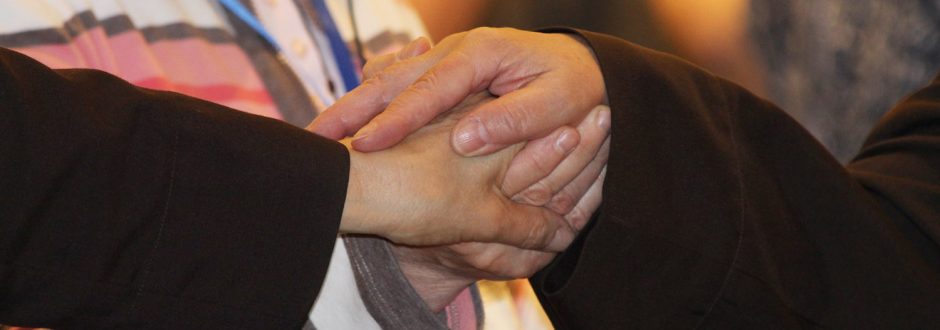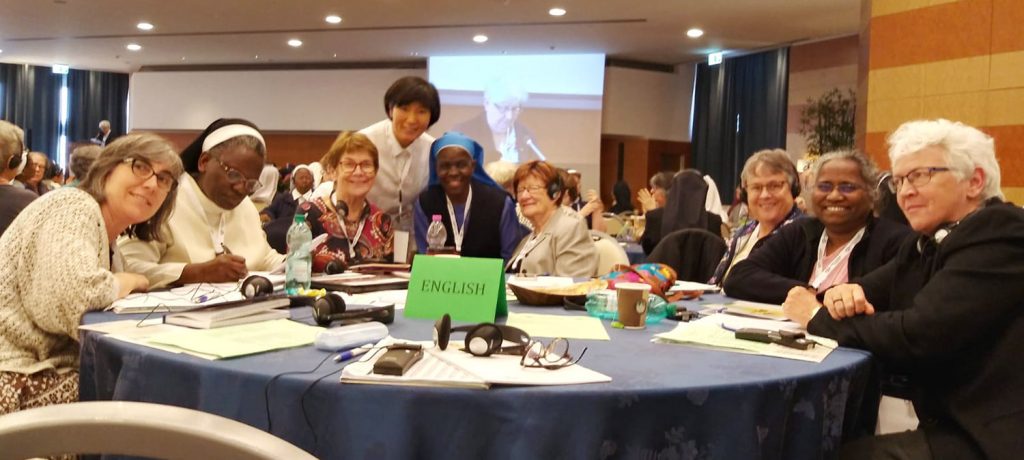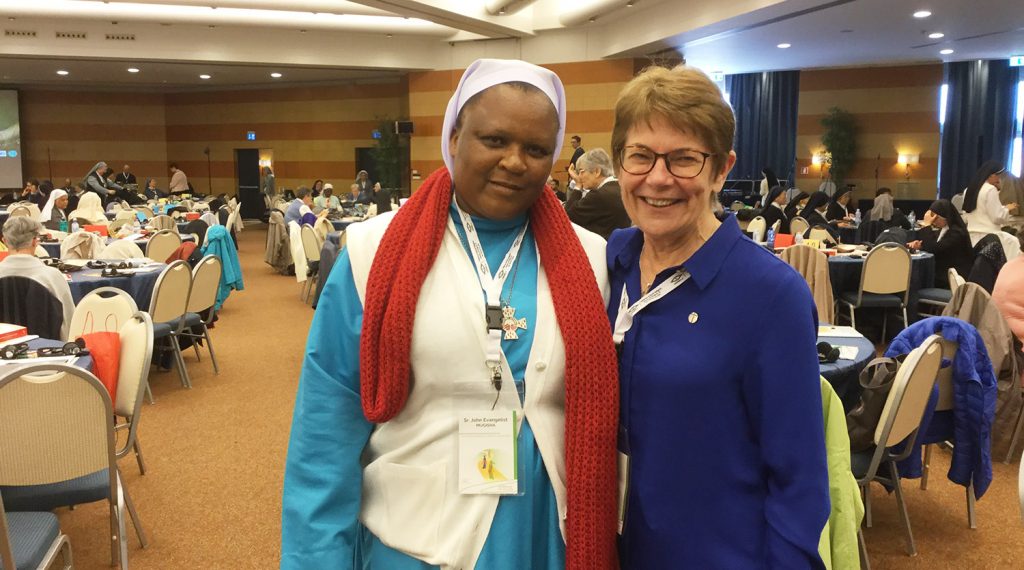There is a rich tapestry in the life of Religious women across the world, writes Sister Patty Fawkner, woven together through a shared mission of hope and compassion.
BY Patty Fawkner SGS
I looked into their eyes as they stretched out their hands. “The body of Christ,” I said, and placed the small white host into their cupped palms. Hands old, and not so old, rough and smooth, black, white and brown.
I had been chosen at random to distribute communion during the opening Eucharist for the Plenary of the UISG, the international union of leaders of Catholic women’s religious congregations. This was, for me, a moment of grace.
Deeply moved, I treasured the intimacy we shared as Religious women all. I offer you the Body of Christ and honour you as together we are the Body of Christ and are called to love and compassionately serve the Body of Christ.
Speaking 13 different languages, 850 of us had travelled to Rome from 80 different countries for this triennial event. The variety of clothing was the most obvious sign of diversity. There were African Sisters in colourful dresses and matching turbans, sari-clad Indian Sisters, Sisters in traditional habits and an equal number in secular dress.
Later that week during a papal audience, Pope Francis assured us that one mode of dress was no better than another. He joked how uniform habits were in the past – mainly black with only face and hands showing, and seemed to delight in the variety of dress since the Second Vatican Council. “Each of you needs to discern with your community what is best for you,” he said. I liked Francis for his inclusiveness.
Diversity of dress, culture, spirituality and theology. Some Sisters were eager to hear from Francis if there was any movement in his thinking about women deacons, while others prior to the audience had been heard to cry, “Women deacons? No, no, no!” The commission Francis set up to explore this issue, at the request of UISG, was “inconclusive” and needed more work. But there was “movement”, he assured us. We shall see.
Some women led congregations whose work would soon come to completion or “fulfilment” as some preferred to describe it. They had but a few elderly members and have already transferred their ministries to the care of other Church organisations or to the laity.
Other congregations in the global South – India, Sri Lanka and Africa – were struggling to cater for their booming numbers. There were Chinese nuns wearing habits which they could only wear outside China. There were teachers, nurses and social workers who supported the local people in some of the most dangerous places on the planet. One Sister gave a graphic account of atrocities she had witnessed in Central Africa. It left us shaken and disturbed.
“Sowers of Prophetic Hope” was the theme of the Plenary, and time and time again, story after story, we were reminded how our world and planet are desperate for hope. Even when poverty, conflict and acute human need conspire to shrink our hope, as religious women we are not faithful to our calling if we are not women of hope.
We celebrated the small seeds of hope being planted when we engaged in intercultural living and inter-religious dialogue, when we worked against the trafficking of an estimated 15 million women, children and men throughout the world, and when we took small, but practical, steps in ecological conversion. We were invited never to shirk dialogue and encounter, especially with the “other” from different cultures and faith traditions.
A Sri Lankan superior told how her community responded with practical and emotional support to victims of the bombings in the Catholic churches on Good Friday. We were challenged to be risk-takers. When various agencies and NGOs withdrew from some trouble spots because of heightened security, the local people asked of the Sisters, “Will you go too?”. The Sisters opted to stay. Over and over again, speakers reminded us that the greatest need of our world was the compassion of the Good Samaritan.
Carmen Sammut, the outgoing UISG President, challenged us not to wait for bishops or the state, but to lead the way in the care of children and vulnerable adults. “We will be judged by the standards of the future. We are meant to be leaders of reform,” she said.
In Australia, we are only beginning to hear about the sexual abuse of women religious at the hands of priests and bishops. We attended a most sobering closed session on this crime which, like all sexual abuse, has been hidden for too long by silence, shame and denial. The abuse of religious women occurs in all cultures, all countries, and across all economic backgrounds, and has also occurred within the walls of the Vatican.
At the audience, which concluded the Plenary, Pope Francis looked tired but was natural, open and transparent. He discarded his prepared speech and engaged in a mutual exchange with Sr Carmen and then invited spontaneous questions from the floor.
He acknowledged the abuse of women religious and urged the leaders to “caress the fragility of your Sisters. Go into the heart of your Sisters. Don’t be afraid of their fragility. Be mother, sister and servant to your Sisters.”
One of the many delightful gifts of the UISG Plenary for me was to discover another congregation called the Good Samaritan Sisters in Uganda. Their leader, Sister John Evangelist Mugisha, described their charism as “indiscriminate mercy and compassion for the needy of society”. Since leaving Rome, Sr John and I have communicated by email exploring how we might engage in some joint venture as Good Samaritans.
I left Rome, proud to be a Good Samaritan and proud to be in solidarity with religious women throughout the world. Religious life continues to evolve and there will be even greater diversity of expression in the future. It occurs to me that this diversity will only be legitimate if individual Sisters and communities are sowers of prophetic hope. For this I hope and pray.


